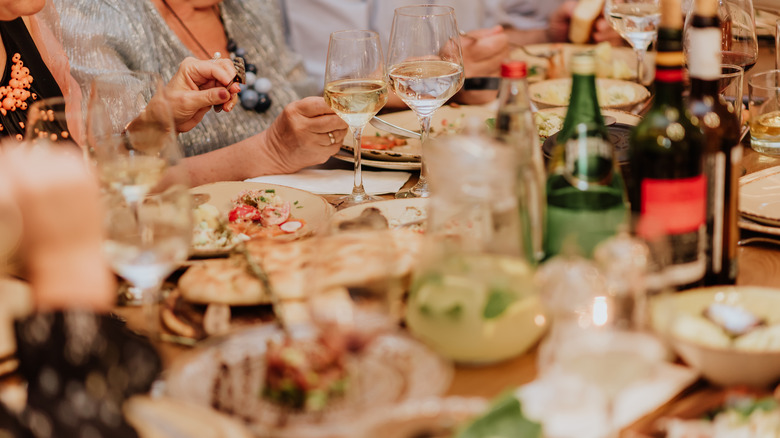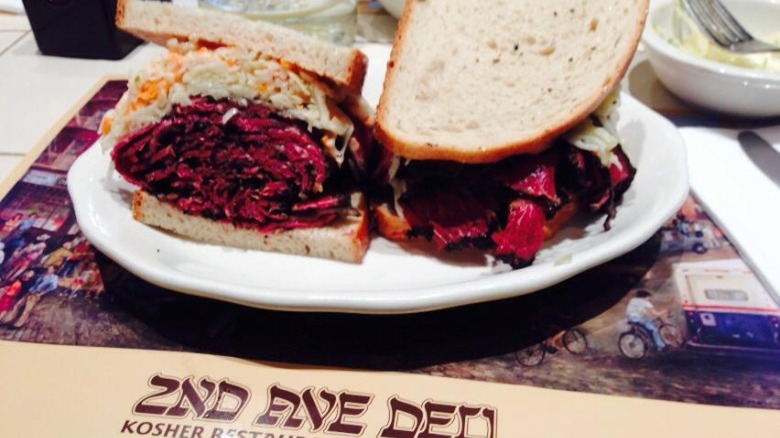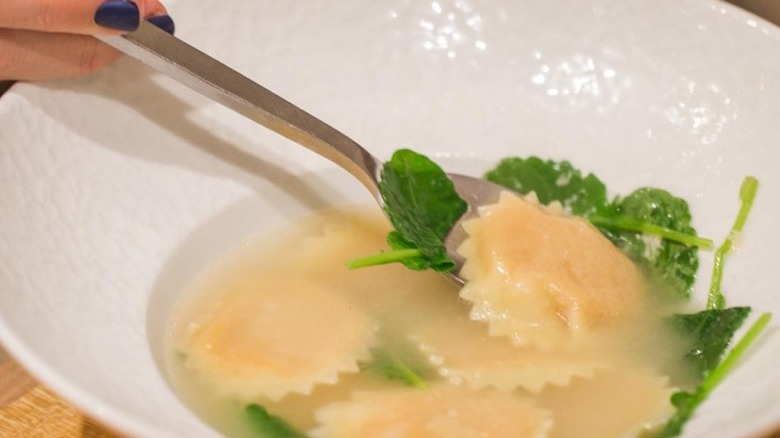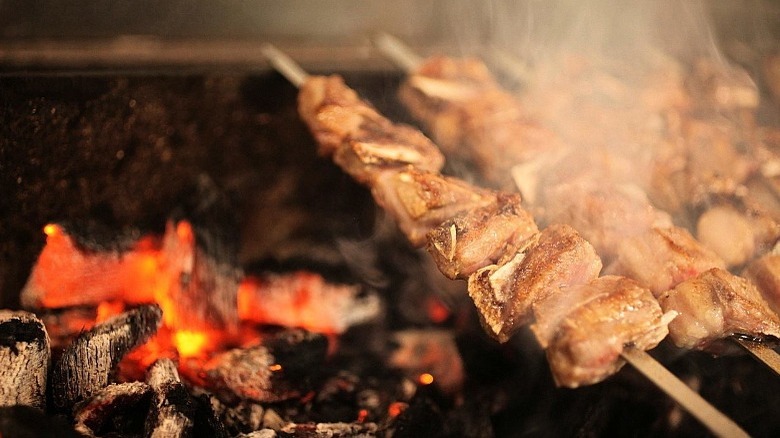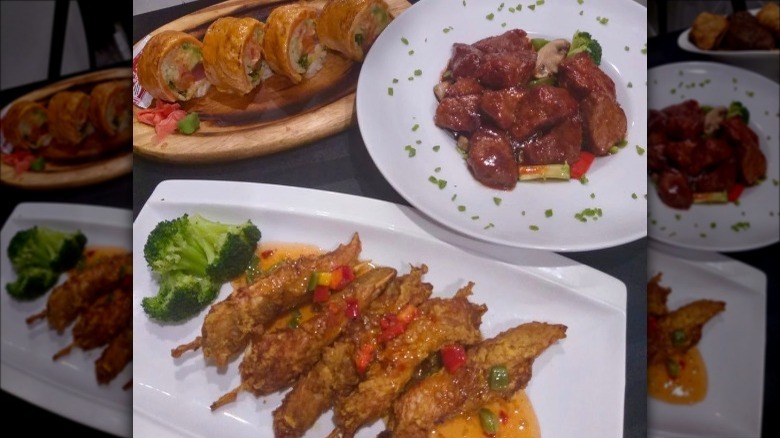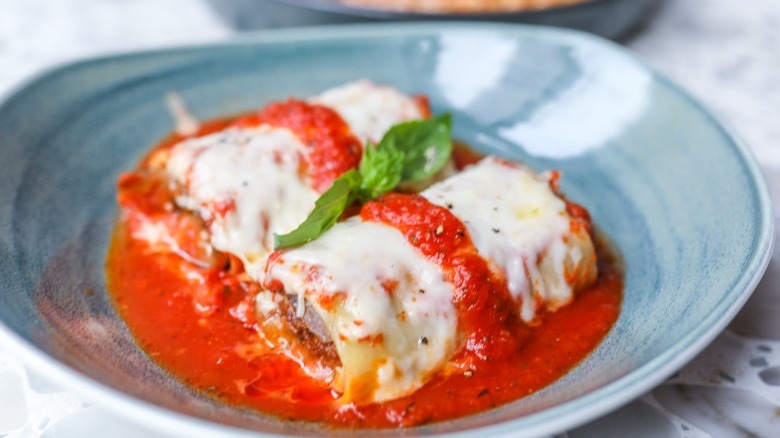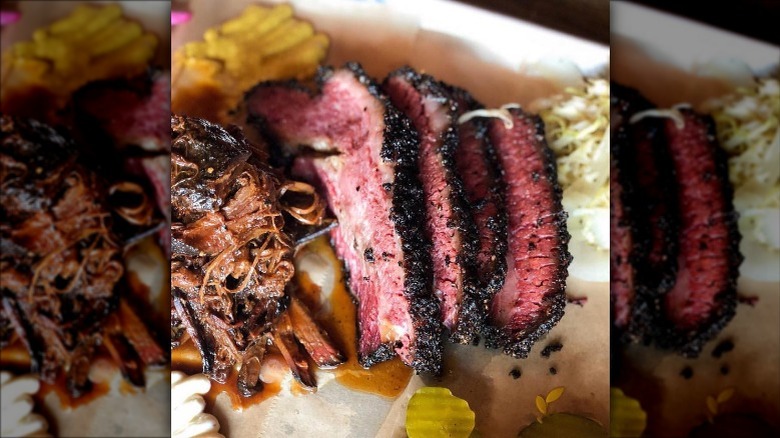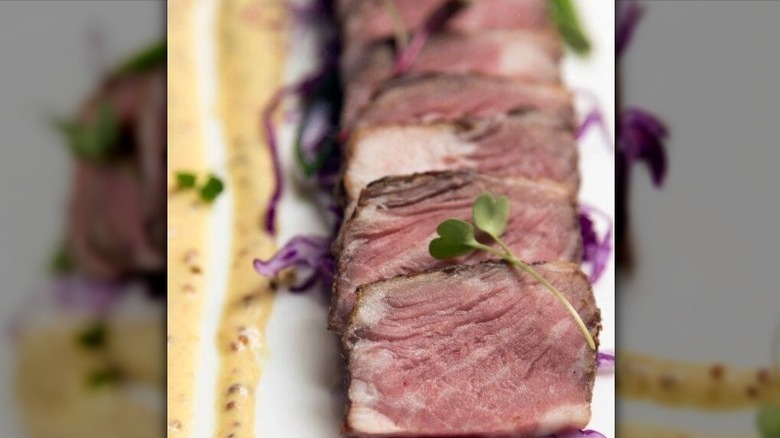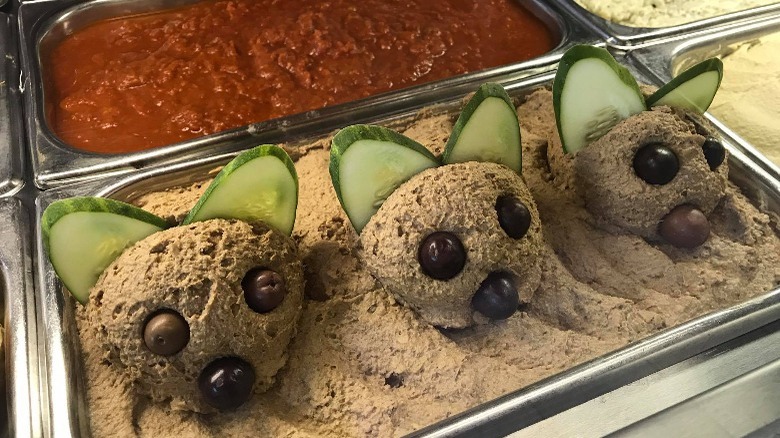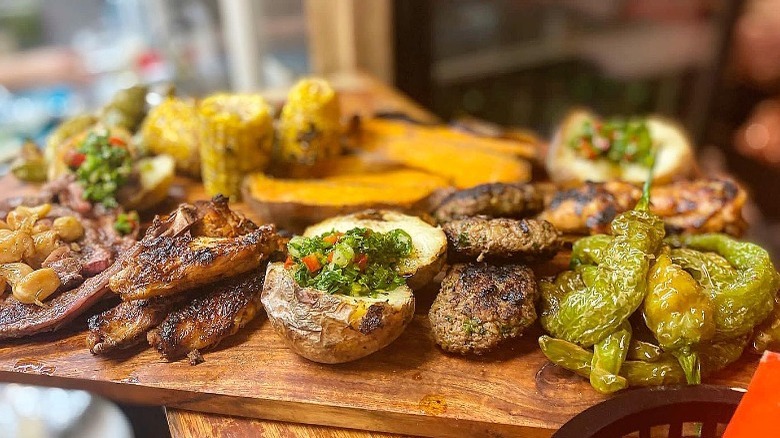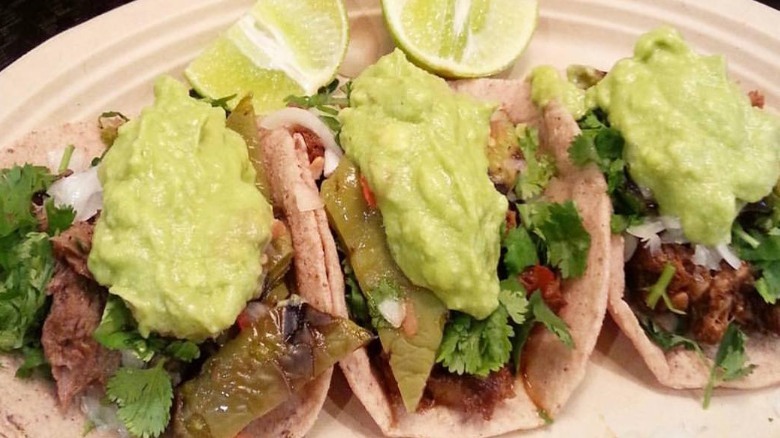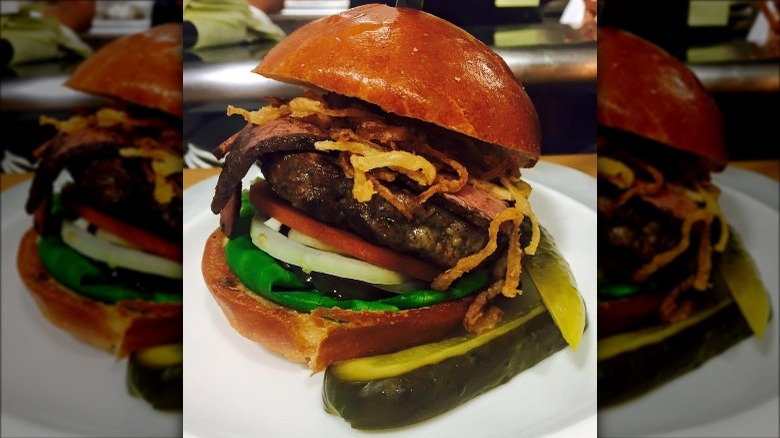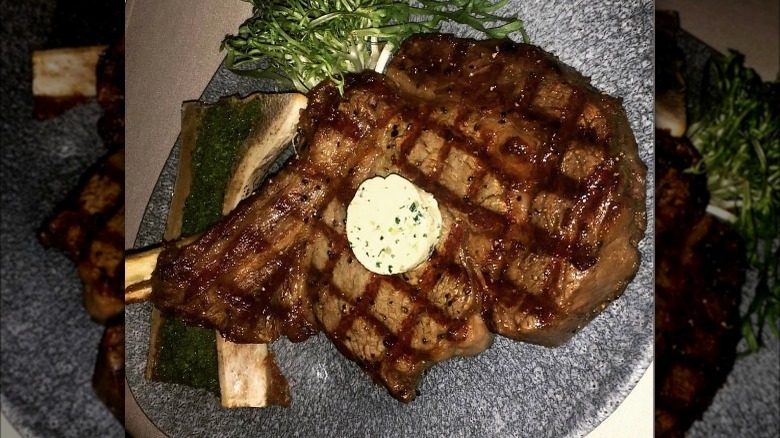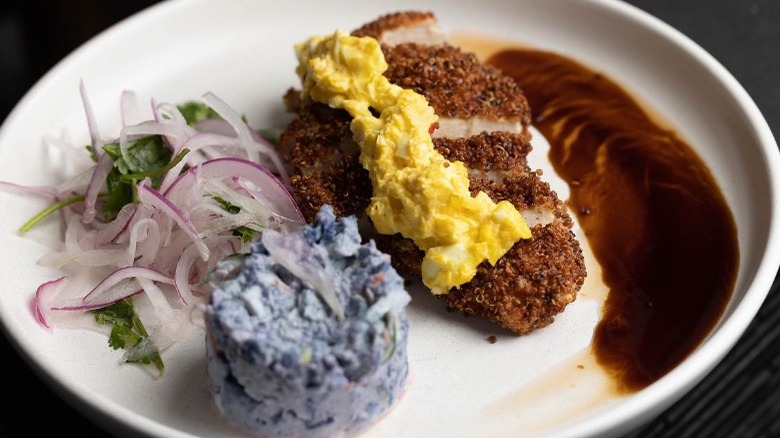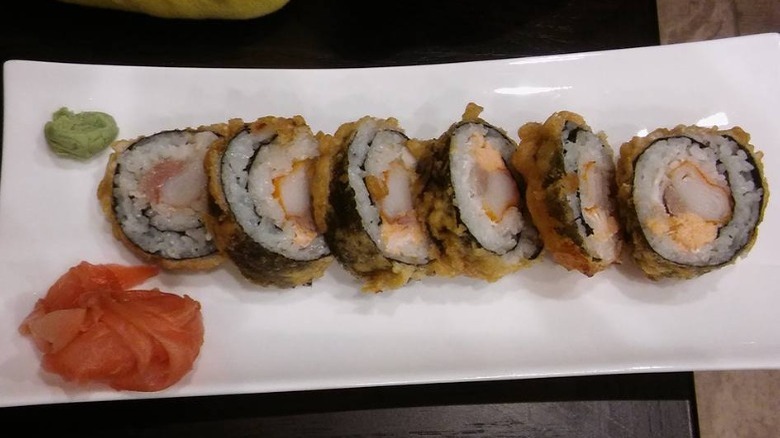15 Best Kosher Restaurants In NYC
If you want to eat kosher and you live in Sioux Falls, South Dakota, you won't need to spend too much time debating where to eat – South Dakota Jewish Center Alevy says there's a Minneapolis-based food truck that arrives once every six weeks, so the rest of the time you'll be dining chez vous. In New York City, however, you're practically spoiled for choice, which is only what you'd expect in the city with the highest per-capita Jewish population. As per the Jewish Virtual Library, 11% of residents in the New York metropolitan area identify as Jewish.
So how many kosher restaurants are there in the Big Matzoh Ball, anyway? It's tough to keep an exact count, but Eater identified 300 as of 2016. Kind of impressive, especially since kosher restaurants can be more difficult to run. Not only do kosher spots have to source and prepare ingredients according to strict dietary laws called kashruth (as per Britannica), but their hours are shorter and typically do not operate on Fridays and holy days. Nonetheless, the kosher restaurant scene in NYC continues to thrive (keyn 'eyn-hora!). While it may be impossible to single out each and every standout, these are some of our top picks for can't-miss kosher dining.
2nd Ave Deli
If you're looking for the quintessential kosher dining experience in Midtown Manhattan, you could do a lot worse than the 2ndAve Deli. The deli, after all, is "an internationally renowned Gotham landmark" if it says so itself (and it does). It's not hyperbole, though, as it has one credential that pretty much guarantees a restaurant's iconic status: its own cookbook. "The 2ndAve Deli Cookbook: Recipes and Memories from Abe Lebewohl's Legendary Kitchen" came out in 1999, but it can still be purchased new from Amazon, which is nice if you live in Sioux Falls and have to do your own kosher cooking.
If you're visiting the City, though, you should definitely stop by 2nd Ave Deli for a not-so-quick nosh. Try not to plotz at the prices as you peruse the menu ($25 for hot pastrami? Welcome to New York!) since legendary eats don't come cheap. The Gate describes the pastrami as "so tender it almost melted in my mouth," while the corned beef and tongue, for more adventurous eaters, is also "tender, full of flavor, and ... an excellent sandwich." One note for kosher newbies: don't expect cheese on your sandwich, as the 2nd Ave Deli doesn't do dairy. Chabad explains that fleishig restaurants stick to meat, while milchig ones are vegetarian (though not vegan) since they feature dishes with cheese and milk. Both egg salad and gefilte fish are on 2ndAve's menu, though, since fish and eggs are pareve (neutral).
Abaita
Abaita is at the opposite end of the kosher spectrum from 2nd Avenue Deli, thus proving that we really do intend to cover the waterfront here (though, actually, we're just going in numerical-to-alphabetical order). As opposed to an old-school fleishig deli, it's a hip, modern milchig bistro. With cheese to work with and pareve foods like fish, vegetables, and pasta, Abaita opts for Italian cuisine, and one look at the menu will reassure you that you'll never miss the meat.
Wood-fired pizzas are an Abaita specialty – Kosher Cactus recommends the Margherita, while the piccante with its shishito peppers and Calabrian chili oil will appeal to spicy food fans. It also has pasta dishes, salads, and fish entrees, including yellowfin tuna, sea bream, and salmon. There are desserts, of course (a milchig menu offers ample scope for such treats as lemon curd with brown sugar crumbles), plus a very lengthy kosher wine list with all wines being appropriately mevushal (these are wines that stay kosher even when handled by non-Jews). Non-drinkers are non-forgotten, though, as Abaita also offers a nice selection of mocktails in addition to sodas, coffee and tea drinks, and sparkling water.
Cheburechnaya
Ever eaten Uzbeki food? While there are a handful of Uzbek restaurants scattered throughout the U.S., it's still not something that's latched on in flyover territory just yet. Queens, however, has been a hub for Uzbek restaurants since the early 00s. According to a 2006 New York Times article, many were established by Bukharian Jews who left Central Asia for New York as the Soviet Union collapsed. Cheburechnaya's co-owner Isak Masturov said of the Bukharians, "Even though we were in exile from Jerusalem, we observed kashruth," and he continues to do so at his restaurant, as well. As one Google reviewer notes, Cheburechnaya is "The only Uzbek-Russian restaurant offering kosher כשר menu," but they rate it 5-stars and say it's worth a 40-minute drive.
Cheburechnaya's menu is definitely fleishig, as the chebureks from which it takes its name are meat-stuffed fried turnovers. Offerings also include Russian-style specialties like borscht and pelmeni, while there are several rice pilaf dishes reminiscent of Mediterranean cuisine. Yet another specialty at Cheburechnaya is shish kebab made with a range of meats from veal hearts to lamb testicles and beef brains, although non-offal eaters may prefer grilled quail, chicken, lamb ribs, and skirt steak. The wine list features bottles from Israel and California, while the brief but delightful dessert menu is heavy on honey and nuts: two types of baklava (walnut and pistachio) as well as a fried noodle dish called chak-chak.
China Glatt
If there ever were a food marriage made in shamayim, it would be that between Chinese and kosher. After all, many Chinese menus are naturally fleishig — as EthnoMed points out, Chinese cuisine is very light on dairy due to the prevalence of lactose intolerance in this population. There's also a long tradition of Chinese restaurants catering to a Jewish clientele since the two groups found themselves neighbors on New York's Lower East Side early in the last century (via Newsweek). Plus, as everyone knows, you can't have Jewish Christmas without Chinese food. China Glatt, however, is ecumenical — its website advertises "the ultimate Chanukah experience" party package for celebrating that other winter holiday. It also announces its strict adherence to the laws of kashruth.
The Great Kosher Restaurant Foodies Facebook group describes China Glatt as "offering generous portions of delectable Chinese food in an upscale atmosphere," and heaps high praise for Chinese-American menu standbys such as pepper steak and sesame chicken as well as the sushi that's also on offer. For a true fusion experience, though, you could always try the pastrami pie appetizer or the chef's special Beijing chicken with bbq pastrami. What you won't find on China Glatt's menu is moo shu pork, shrimp toast, or anything else made with non-kosher meats, but there are sufficient chicken, beef, and even salmon dishes in the restaurant's repertoire that you'll never miss them.
Coletta
While we've discussed how well an Italian-style menu works well for a kosher dairy restaurant such as Abita, what happens when no actual dairy products are used? Coletta has taken on a rather challenging proposition, that of offering dairy-free milchig kosher with an Italian flair. Chef Guy Vaknin, who previously opened the vegan Beyond Sushi chain as well as a few other vegan (and also kosher) eateries, tells Timeout, "The idea is that you come into Coletta, and you don't feel like you're eating at a vegan restaurant at all" since he estimates that half of his clientele aren't vegan.
The vegan Italian kosher food on Coletta's menu involves a lot of quotation marks, i.e., "parmesan," "ricotta," and "feta," as well as mock meats like "chick'n" and "bac'n," both of which feature in the chick'n linguini alfredo. There are even vegan versions of prosciutto and pepperoni, both of which are used to top flatbread pizzas, the former with fig jam, the latter with marinara and "mozzarella." There's even seitan "steak" marsala and a "scallop" risotto made with oyster mushrooms. Coletta's food is a big hit with vegans, of course –- it rates 4.5-stars on Happy Cow -– but it also has 4.5-stars on Yelp, even from non-vegans. One person raves about the "calamari," saying, "I'm a pescatarian and don't normally love seafood substitutes, but these tasted like the real thing." At the same time, another self-professed "meat lover" feels that Coletta's mock prosciutto "is better than normal prosciutto."
Gottlieb's
There's kosher, and there's kosher, and then there's seriously kosher, which is to say, glatt. As Atlas Obscura explains, glatt kosher restaurants must have religious supervisors (mashgiach) on hand whenever food is being prepared, plus it must also be ensured that the only meat they use comes from animals whose lungs had a clean bill of health (no burgers from a cow with a two-pack-a-day smoking habit). Whether it's difficult sourcing this meat or a good mashgiach is hard to find, or it's just due to the overall tsuris involved in keeping glatt, there are very few such restaurants left. Of the ones remaining, Gottlieb's, located in ultra-Orthodox Williamsburg, is still the standard-bearer. As one Trip Advisor user reports, they asked a staff member if the food was kosher, and they replied, "It does not get any more kosher than this!"
Gottlieb's menu runs to deli standards, like sandwiches (pastrami, corned beef, and brisket, all available on rye with sour pickles, of course) and matzoh ball soup. You'll also find a few Hungarian dishes on the menu, including beef goulash, stuffed cabbage, and chicken paprikash main. (As per Atlas Obscura, founder Zoltan Gottlieb was from Hungary.) Other must-try kosher Jewish foods on the menu include latkes, kishkes, shlishkes, knishes, and five different types of kugel ranging from sweet noodle and apple to savory potato and salt and pepper and even the sweet/savory Israeli specialty known as Yerushalmi kugel (via My Jewish Learning).
Izzy's Smokehouse
Kosher barbecue? Can that be a thing? Sure, why not, as long as you can live without pulled pork? The first Izzy's Smokehouse opened in Crown Heights in 2015 (per Forward) but has since been joined by locations on the Upper West Side and even Miami (the Sixth Borough). As to why Izzy's is so popular, it's because Izzy, aka Sruli Eidelman, is one of the best pitmasters in town and has the trophies to prove it – NYC BBQ says he took home top honors at 2019's Rib King NYC while Forward reports that he won the title of Brisket King NYC in 2017. Pork, schmork, who needs the stuff when you've got such a way with beef?
Izzy's doesn't just wow the critics but its customers, as well. It currently boasts a 4.8-star rating on Facebook, with one reviewer calling its food "The best barbecue I've ever had!" Eidelman and his staff have mastered the classics such as bbq chicken, pulled beef, burnt ends, and that award-winning brisket that The Infatuation calls "our favorite thing here" and describes as "lean but tender ... smoked for 18 hours, to the point where you'll be able to see the char along the edge of each cut." The menu also branches out into some less standard barbecue options, such as lamb ribs and ribs glazed in a sticky, Thai-style sauce, as well as Korean chicken bites and tacos, empanadas, and egg rolls made with pulled beef.
Le Marais
Le Marais takes its name from a Parisian neighborhood known for its strong Jewish community, but the restaurant's founder Jose de Meirelles is from Portugal and is not Jewish. Chef Mark Hennessey is Irish-Italian American and also not Jewish, although he considers himself a culinary shabbos goy of sorts. As Hennessy reveals in a short write-up on the restaurant's history, both men initially felt that French cuisine and fine dining would both be incompatible with kosher dietary laws since how can you do a proper job without cheese, cream, and butter in combination with the finest-quality meats including both pork and shellfish? Impossible though it once seemed, Meirelles and Hennessy rose to the challenge and created one of New York's culinary gems together.
According to Great Kosher Restaurants, "Le Marais is simply one of the best kosher steakhouses in the country" and list as its standout dishes the Tournedos Le Marais with bearnaise sauce and the La Surprise kosher ribeye. Class and the City tried the galette de saumon (pan-fried salmon cake) and said, "This was the most delicious fish cake I've ever had in my life ... crispy on the outside and so flavorful that adding tartar sauce was not even necessary." The bread, too, they said, was "really wonderfully delicious" with an "incredible homemade flavor." The restaurant menu even features family-style shabbat meals with entrees, including the La Surprise, boeuf bourguignon, chicken tajine, chicken schnitzel with honey mustard, and smoked brisket.
Liebman's
While perhaps the most famous Jewish deli in New York is Katz's, thanks to the "I'll have what she's having" scene from "When Harry Met Sally," that establishment is only "kosher-style" as it doesn't keep kashruth (via Free Tours by Foot). Liebman's Deli, on the other hand, has been dubbed "The Katz's of Riverdale" (the one in the Bronx, not the one from the Archie comics) by New York Magazine. It's been kosher since it opened in 1953, and The New York Times finds its old-school vibe nostalgic and charming.
New York Magazine praises Liebman's skirt steak and stuffed cabbage but also singled out its "absolute best matzo ball soup in New York," which is no small feat (unlike best matzoh ball soup in Sioux Falls, a title that may still be up for grabs). The Times mentions the brisket and pastrami, as well as sauerkraut-topped kosher hot dogs and stuffed derma. Other deli classics on Liebman's menu include gefilte fish, pickled herring, potato pancakes, salami sandwiches, and chopped liver that it's been known to sculpt into cute shapes (via Facebook). In the spirit of Levantine harmony, there's also a selection of Middle Eastern specialties, including hummus, baba ganoush, and falafel. If you come on a Friday between October and May, you can even order cholent, a bean stew that's been around since Biblical times and may have been eaten at the Last Supper. (As per Aleteia, it's possible that Jesus himself kept kosher.)
Mama Kitchen NY
Mama Kitchen NY is a Brooklyn restaurant that offers Israeli-style Kosher food, but unfortunately, its website link appears to be broken at present, so we don't have too much info as to its back story, how and why it got its start, etc. What we do have to go on is its Instagram page, which is full of very attractive food photos, but many of these are uncaptioned. Kind of frustrating — after all, it's easy to see something you like, but embarrassing to have to pull it up on your phone and ask your server, "What is this, and is it on the menu tonight?" It's especially problematic when you consider the fact that many of these images are actually short films instead of photos. Informative captions might be helpful; just saying.
What we know is that Mama Kitchen has a 4.5-star average on Yelp and rates 5-stars on Facebook, so it's obviously doing something right. Not only do customers praise the food with accolades like "Best Hummus ever" and say the shakshuka tastes just like they make it in Tel Aviv, but they're enraptured by the atmosphere. One Facebook reviewer says, "Outside sitting under the tree felt like I'm home," while another says, "Great food, great service..... worth the 3-hour drive EACH WAY." A Yelper who ordered the roasted vegetables with salmon describes their reaction as "rendered dumb by flavor ... tearing up with emotion." Sounds like a winner!
Mexi-Ko
Mexi-Ko has another of those "only in New York" stories -– it's a kosher Mexican restaurant with a Japanese-Mexican chef who, of course, has appeared as a contestant on a TV cooking competition show (as has just about any other chef worth their fleur de sel these days). According to Bravo TV, Katsuji Tanabe has so far appeared on season 12 of "Top Chef" as well as "Top Chef Mexico," but apparently, he finds such competition addictive, so we're likely to be seeing more of him onscreen.
Mexi-Ko at present has two locations, one in Manhattan and another in Lawrence, NY. The Manhattan location shares its space with two other establishments under the Graze brand umbrella, Graze Smokehouse and Carlos & Gabbys (both of these restaurants are also kosher). The menu is a shared one as well, but the section specific to Mexi-Ko is short and simple, limited to a choice of build-your-own burritos, tacos, nachos, or bowls (rice or quinoa). A few of the topping options are vegan — grilled vegetables and mock chicken — while the rest are variations on grilled chicken and various types of beef (carne asada, taco meat, and barbecue). The most intriguing option may be the carnitas made from slow-roasted beef and duck confit, which is not the kind of thing you're going to see at Chipotle. As to how Tanabe adheres to kosher laws, he's told the Los Angeles Times that his crema is soy-based, while cheese simply isn't an option.
Mocha Burger
As Great Kosher Restaurants points out, so many of New York's kosher restaurants are all clustered in hop spots like Midtown or the Upper West Side, so when Mocha Burger broke the mold by opening a location close to the NYU campus in 2015, it pretty much had a built-in audience right there. What's more, Mocha is not just kosher but glatt kosher, and its website proudly trumpets the fact that it's "certified under the ORTHODOX UNION." Also, the beef for its burgers is grass-fed and free of hormones and antibiotics.
Nice, but how do Mocha Burger's burgers taste? Pretty good, as attested to by its 4.3-star Facebook rating and comments like "Great place with delicious food and pleasant ambiance," "absolutely delicious food," and "I think honestly the best kosher burger I've had in NYC." The Mocha Burger menu is extensive, featuring specialty burgers with toppings like fried eggs, barbecued pastrami, and even bacon (made from lamb, since that's kosher). Salmon, chicken, and Impossible burgers and sandwiches are also available, as are a variety of entrees, including steaks, chicken, and spaghetti; Mocha Burger even offers a range of satays (beef, chicken, and salmon) as well as non-dairy dessert parfaits. Its food's not cheap (a plain burger starts at $20), but then, what did you expect? It caters to NYU students, and since the school's tuition as of Fall 2022 runs to over $55k per year, a $20 burger is bupkis.
Reserve Cut
Michelin-starred restaurants are few and far between, and to date, there's only one in the world that is also kosher-certified, that being Barcelona's Xerta (via Sawyer). New York, however, has a kosher restaurant with a Michelin-starred chef — Richard Farnabe, who signed on as the corporate chef at Reserve Cut in 2019 (via Food & Beverage Magazine). This makes the restaurant the first kosher establishment in the U.S. to have a chef who's held the coveted star. Farnabe's mission: to transform this kosher steakhouse into Michelin star material, complete with gourmet but kashruth-compliant fare.
As the company's founder also owns a butcher shop called The Prime Cut, the Reserve Cut menu is as fleishig as it gets, with wagyu beef, tomahawk steaks, grilled lamb chops, and a super-fancy burger named the Golden Age that's made white truffle butter, shaved black truffles, and gold dust. Fish dishes include pistachio-crusted salmon, Mediterranean-style branzino, and a range of sushi rolls (one with caviar). As the menu states, decadent desserts like tiramisu and molten chocolate cake are 100% dairy-free, while the wine list gets downright biblical with labels from Galilee and Jerusalem. The restaurant even offers those extra-large bottles dubbed Jeroboam (3 liters), Methuselah (5 liters), Salmanazar (9 liters), and the behemoth Balthazar (12 liters). L'chaim! Needless to say, Reserve Cut is uber-pricey, but as one of many 5-star Open Table reviews put it, "I can absolutely say that this is one of the most amazing experiences I have ever had."
Sen Sakana
While Peruvian food may not be quite as ubiquitous as tacos, pupusas, or empanadas, it is nevertheless making inroads in the U.S. culinary scene. By now, many of us are now familiar with Peruvian pisco sours, the difference between Mexican and Peruvian ceviche, and the delicious roast chicken known as pollo a la brasa. However, what's less well-known is Nikkei cuisine, a fusion cooking style that dates back to the late 19th century when Peru welcomed a number of Japanese immigrants. Sen Sakana, which opened on West 44th Street in 2017, is entirely dedicated to that type of cuisine — and yes, it holds several different kosher certifications, including glatt.
The New York Times has praised many of Sen Sakana's standout dishes, including gingery gyoza and Japanese sweet potato skewers with aji amarillo butter. They also single out the oyakodon, which includes such "pleasantly unorthodox" ingredients as cilantro and pumpkin, and the sushi that manages to blend flavors from both hemispheres, such as sea bream sauced with aji amarillo, yuzu, and salted plum paste. Gayot is even more enthusiastic about Sen Sakana, asserting that the restaurant's "flavor combinations are among the most exciting in the city." One thing's certain: this isn't your Bubbe's kosher restaurant.
Sushi Meshuga
Meshuga, if you know your Yiddish, is a word that means "crazy" — but, meshuga as it may seem, The New York Times reports that orthodox rabbis objected to the name when Brooklyn-based Sushi Meshuga opened a new location in Borough Park, so it had to operate there under the name Sushi Meshuna instead (meshuna meaning the apparently less-objectionable "strange"). The idea of kosher sushi isn't meshuga (or even meshuna) at all, however. Fish and rice are both considered pareve, so the only concern is to keep from using shellfish in any of the preparations. While a sushi restaurant could either go fleishig or milchig, Sushi Meshuga's menu leans toward the latter as it does use cream cheese in some rolls. However, it has no meat products other than fish, which keeps it in good standing with its kashruth supervisors (Kehilah Kashrus, as the menu proclaims).
Sushi Meshuga has a 4.4-star Google rating, with numerous comments enthusing over the fresh ingredients and the relatively low prices. As per the menu, the basic rolls start at $5.50, while the most expensive items are the $14.95 poke bowls. Well, there are some pricier multi-roll dinners available, including a $29.95 18-piece nigiri "Shabbat Special," but unless you've got an enormous appetite, that amount should be sufficient for sharing. One reviewer calls Sushi Meshuga the "Best kosher sushi place," while another praises its offerings as the "Tastiest, freshest sushi ever ... like seriously amazing."
